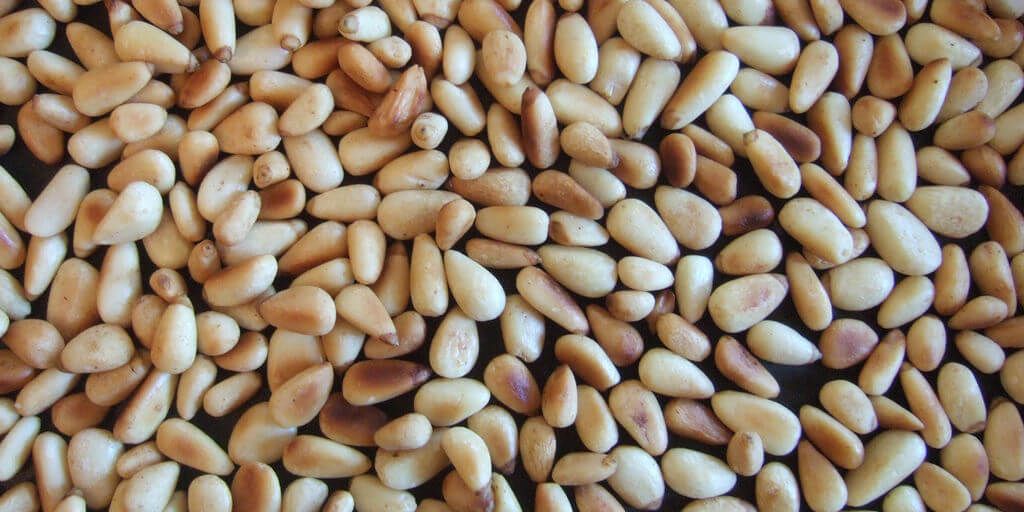Pine nuts are the seeds of pine cones, usually from the Stone Pine Tree (Pinus pinea). Most sources suggest that the use of pine cones has been known for over 6,000 years. They are grown in Europe, Korea, North America and Asia. The Native Americans are responsible for much of the pine nut production in the United States.
Benefits of Pine Nuts
Both pine nuts and pine nut oil can be used for health reasons.
Below are some of the potential benefits that can be reaped from pine nuts:
Pine Nuts Suppress Appetite for Weight Loss
Consuming less food is one of the keys to weight loss. However, many people struggle to control their appetite. Studies have shown that pine nuts can help suppress appetite. One of the studies involved 18 women who were overweight. The women were given pine nut oil prior to eating a meal that was high in carbohydrates. Another group of women was given a placebo.
The women’s GLP-1 (Glucagon-like peptide-1) and CCK (Cholecystokinin) levels were checked over the course of four hours. GLP-1 and CCK are two hormones that help control appetite. The women were also asked to rate their appetite. The results of the study showed that the women who took the pine nut oil had higher levels of GLP-1 and CCK. They also reported they did not feel as hungry after taking the pine nut oil.
Pine Nuts are High in Fiber
Pine nuts are also a high-fiber food. In fact, one cup of pine nuts contains five grams of fiber. People who eat fiber-rich foods usually have an easier time losing weight and maintaining a healthy body weight.
Pine Nuts for a Healthier Heart
Pine nuts are an excellent source of vitamin E, copper, vitamin K and iron. All of these nutrients support heart health. Furthermore, pine nuts are an excellent source of monounsaturated fat. Monounsaturated fat is a healthy fat that helps reduce cholesterol. High cholesterol is a risk factor for heart disease. Therefore, pine nuts can potentially reduce the risk of heart attack and stroke.
Pine Nuts Slow Down the Aging Process
Everyone seems to be looking for the elusive Fountain of Youth. One of the simplest things that people can do to look and feel younger is to eat more anti-aging foods. Pine nuts have antioxidants that help fight aging. These antioxidants help prevent free radical damage. Free radicals not only accelerate the process of aging, but they can also increase the risk of cancer and a host of other serious health conditions.
Pine Nuts Prevent Age-Related Macular Degeneration
Age-related macular degeneration is an eye condition that is very common in older people. In fact, 30 percent of people who are over the age of 80 have this condition. This condition is the leading cause of blindness in older adults.
The good news is that diets that are rich in beta-carotene and lutein can help protect against age-related macular degeneration. Pine nuts are an excellent source of lutein and beta-carotene. Additionally, these nutrients can protect against cataracts, which are another eye problem that is very common in older people.
Pine Nuts for a Boost Of Energy
The next time that you feel yourself struggling to have the energy to get through your day, try eating a cup of pine nuts. Pine nuts are high in magnesium and protein, which are two nutrients that your body needs for energy. Magnesium has also been shown to be very effective at alleviating muscle cramping.
Pine Nuts are Free of Gluten
Celiac disease is a condition that occurs when the body is unable to properly digest gluten. Gluten is present in foods that contain barley, wheat or rye. It affects about 1 in 133 people in America. People who have celiac disease are required to follow a diet that is free of gluten. Pine nuts are one of the many healthy foods that people with celiac disease can consume because it is gluten-free.
How to Eat Pine Nuts
Most people eat Stone pine nuts whole (raw or cooked). They are widely used in cooking and are known for their sweet and buttery flavor. They are commonly used in Mediterranean and Middle Eastern cuisines, in dishes like pesto, salads and desserts. Pine nut oil is also available. This can be ingested and also applied to the skin as a very nice skin supplement.
Pycnogenol
You may also be interested in our article on Pycnogenol, which is a liquid extract from the bark of the Maritime Pine (Pinus pinaster), which is a different species of pine tree to the Stone Pine Tree (Pinus pinea) which we get pine nuts from.
Always take care when taking herbs and Read Our Disclaimer.
Pine Nut Notes / Side Effects
Pine nuts are generally safe for most people when consumed in moderate amounts as part of a balanced diet. However, some individuals may experience side effects or allergic reactions.
Here are some potential side effects of pine nuts:
Pine Nut Syndrome (PNS): Some people may develop a temporary bitter or metallic taste in their mouth after consuming pine nuts. This condition, known as “pine nut syndrome” (PNS) or “pine mouth,” typically occurs 12 to 48 hours after eating pine nuts and can last for several days to weeks. While not harmful, it can be unpleasant and affect the taste of other foods.
Allergic Reactions: Although rare, allergic reactions to pine nuts can occur in individuals with tree nut allergies. Symptoms may include hives, itching, swelling of the face, lips, tongue, or throat, difficulty breathing, and anaphylaxis in severe cases. People with known tree nut allergies should avoid pine nuts and products containing them.
Gastrointestinal Issues: Eating large amounts of pine nuts may cause digestive discomfort in some individuals, leading to symptoms such as nausea, vomiting, diarrhea, or stomach cramps. This is more likely to occur if pine nuts are consumed in excessive quantities.
High Caloric Content: Like other nuts and seeds, pine nuts are calorie-dense and contain significant amounts of fat and calories. Consuming them in excess without accounting for the additional calories may contribute to weight gain or hinder weight loss efforts in some individuals.
Potential Contamination: Raw or improperly stored pine nuts may become contaminated with mold, bacteria, or other pathogens, which can cause foodborne illnesses if consumed. It’s essential to store pine nuts properly in a cool, dry place and ensure they are fresh and free from signs of spoilage before eating.
Overall, pine nuts can be a nutritious and flavorful addition to a healthy diet when consumed in moderation. However, individuals with allergies, sensitivities, or underlying health conditions should exercise caution and consult with a healthcare provider if they have any concerns about consuming pine nuts or experience adverse reactions.



Leave a Reply